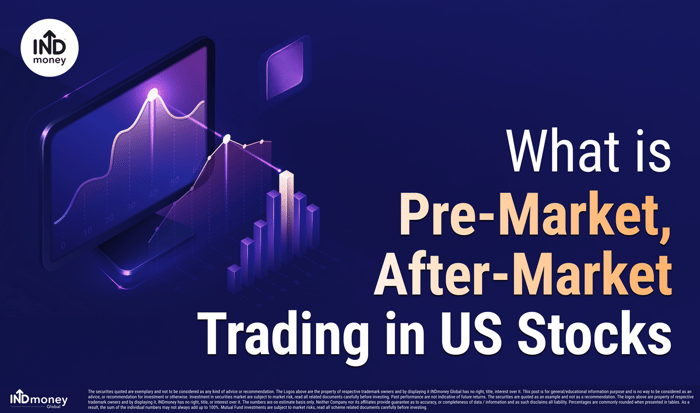
- What Is Pre-Market Trading?
- What Is After-Market Trading?
- Can Indian Investors Trade in Pre-Market and After-Market Sessions?
- Tips for Trading in Extended Hours
Most people think stock trading only happens from 9:30 a.m. to 4:00 p.m. ET in the US, but the reality is far more interesting. The stock market actually has life before the bell and after it closes. These times are called pre-market and after-market sessions, or more simply, extended-hours trading. If you’ve ever wondered why a stock jumps in price when the news comes out late at night or early in the morning, extended-hours trading is the reason.
Let's break down with this blog what pre-market and after-market trading really means, how it works, why it matters, and how Indian investors can participate without unnecessary risk.
What Is Pre-Market Trading?
Think of pre-market trading as the early risers’ club of the stock market. It happens before the regular session starts. While most people are still waking up, traders and institutions are already reacting to news from overnight or overseas markets.
Key Features
- Timing: Begins as early as 4:00 a.m. ET, with activity rising closer to 8:00 a.m. ET.
- Platforms: Conducted through Electronic Communication Networks (ECNs) instead of traditional exchanges.
- Liquidity: Typically lower than regular hours which simply leads to wider bid-ask spreads, thereby leading to high liquidity risks.
- Participants: Includes institutional investors, active traders, and retail investors.
Why Trade in Pre-Market?
- React to News: Allows investors to respond to overnight news, earnings reports, or geopolitical events in advance of regular markets.
- Strategic Positioning: Helps traders establish positions before the market opens. It gives the traders or investors the potential to capitalize on anticipated movements.
- Market Sentiment: Offers insights into how stocks might perform once the regular session starts.
Risks of Trading in Pre-Market
- Volatility: Prices can swing significantly due to lower liquidity.
- Execution Risks: Orders may not be executed at desired prices.
- Limited Participation: Not all brokers allow pre-market trading, and some may have restrictions.
What Is After-Market Trading?
After-market trading is the opposite: it starts once the regular session ends and continues for a few hours. This is the time when companies often release earnings, important announcements, or when global events from Europe or Asia influence US stocks.
Key Features
- Timing: 4:00 p.m. to 8:00 p.m. ET.
- Platforms: Similar to pre-markets this is also conducted with the help of ECNs.
- Liquidity: Typically lower which again leads to high liquidity risks.
- Participants: Institutional investors, active traders, and retail investors.
Why Trade After Market Hours?
- Earnings Reports: Companies often release results after market close which impact stock prices. You can get into action ahead of normal markets.
- Global Events: Investors can react to international developments which occur after US market hours.
- Portfolio Adjustments: Offers the chance to make strategic trades based on the day’s performance.
Risks of Trading After-Market
- Lower Liquidity: Can result in wider bid-ask spreads.
- Price Volatility: Significant price movements are common due to fewer participants.
- Order Restrictions: Some brokers limit order types or execution during after-hours sessions.
Can Indian Investors Trade in Pre-Market and After-Market Sessions?
Indian investors can participate in US extended-hours trading, but there are a few points to keep in mind:
- Trading Timings in IST:
- Pre-Market: ~1:30 PM - 9:30 PM
- Regular Market: ~7:00 PM - 1:30 AM
- After-Market: ~1:30 AM - 5:30 AM
(Timings adjust when the US switches between Daylight Saving Time and Standard Time.)
- Limit Orders Only: Due to lower liquidity, only limit orders are supported during extended hours.
- Regulated & Secure: Trades are executed through platforms compliant with US regulations, ensuring investor protection.
Extended-hours trading allows Indian investors to react to earnings, news, or global events immediately, without waiting for the next day’s regular market session. However, it requires careful planning due to volatility and lower liquidity.
Tips for Trading in Extended Hours
If you’re thinking of trying it, here’s the practical way to approach it:
- First, always use limit orders as you want to control the price, not hope for the best.
- Second, always stay informed: overnight news, earnings, or geopolitical events can move stocks sharply.
- Third, know the rules of the platform you are using, different brokers have different restrictions for extended-hours trading.
- And finally, manage your risk: smaller positions or conservative strategies often work better in these sessions because of higher volatility.
Pre-market and after-market trading opens unique opportunities for investors and traders to act outside regular market hours. While these sessions can provide early insights and strategic advantages, they also carry higher risks due to lower liquidity and potential price swings. Understanding the dynamics and using careful strategies can help investors, including those in India, navigate extended-hours trading successfully.
Disclaimer:
The content is meant for education and general information purposes only. Investments in the securities market are subject to market risks, read all the related documents carefully before investing. Past performance is not indicative of future returns. The securities quoted are exemplary and are not a recommendation. This in no way is to be construed as financial advice or a recommendation to invest in any specific stock or financial instrument.The figures mentioned in this article are indicative and for general informational purposes only. Readers are encouraged to verify the exact numbers and financial data from official sources such as company filings, earnings reports, and financial news platforms. The Company strongly encourages its users/viewers to conduct their own research, and consult with a registered financial advisor before making any investment decisions. All disputes in relation to the content would not have access to an exchange investor redressal forum or arbitration mechanism. Registered office address: Office No. 507, 5th Floor, Pragya II, Block 15-C1, Zone-1, Road No. 11, Processing Area, GIFT SEZ, GIFT City, Gandhinagar – 382355. IFSCA Broker-Dealer Registration No. IFSC/BD/2023-24/0016, IFSCA DP Reg No: IFSC/DP/2023-24/010.